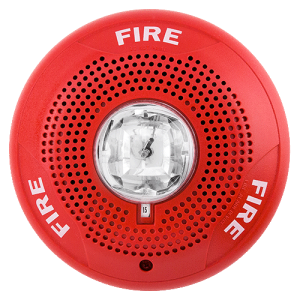The trend in providing today’s building services such as fire alarm and overhead paging is to install them on a common system. Not only does it simplify interaction with these systems since the end user uses one control unit, but it saves money by not having to install and maintain two separate voice systems. Whether or not you can actually use your fire alarm system as a paging system as well initially depends on the fire alarm equipment capability and capacity. If the system can handle the additional amount of speakers that are needed in order for general paging to be heard intelligibly (which is a bigger footprint than fire alarm audibility requirements), will monitor the integrity of each speaker circuit while in use (for background music applications) and can be programmed to prioritize alarm messages over non-emergency use, the designer of record can move to step two.
The next step depends on the fire department’s or other AHJ’s approval. NFPA 72 has allowed the use of the fire alarm voice system for auxiliary use (overhead paging, background music, etc.) since 2010, but even if your local requirements reference an earlier version of NFPA 72, most AHJs will allow the use of these systems for non-emergency use if they are installed per the 2010 version or later. Before time is invested in design, ensure the AHJ will consider auxiliary use of the fire alarm voice system. If they’re open to it, we suggest including a sequence of operation with the review submittal. Getting their buy in and addressing any concerns they may have initially is an ounce of prevention rather than a pound of cure.
We’ll discuss whether an existing PA system can be integrated into the fire alarm system to extend the range of the voice system in our next blog. The Gamewell – FCI E3 emergency voice system is being utilized as the sole method of overhead voice announcements in many campus applications. Feel free to contact Affiliated Fire Systems for more information on how to leverage this system to your advantage.



I’m currently working on a paging system design is SA Texas for a hospital. My client is undecided if they want to integrate the paging Systems with the Fire Alarm System and use one set of speakers.
I would like to know if there is a code for hospitals/medical facilities that state whether or not these systems are required to be integrated. Or can they be separate systems?
thank you very much
Hi Darryl,
I’ve got a lot of experience with this, so I’ll try not to stray from the question. There is no mandate by CMS, NFPA, ICC codes or any other national standard that hospital paging systems be integrated with required fire alarm systems, so they can certainly be separate systems. The bottom line is the audibility level of the fire alarm notification must come from devices directly connected and controlled by the fire alarm system. External PA speakers can supplement that signal, but cannot be relied upon to obtain audibility.
Per NFPA 72, you can use the fire alarm system for non-fire announcements, as long as fire messages take priority (unless otherwise determined in an emergency response plan). The ambiguity usually comes in when you use the fire system to transmit in building mass notification messages (code blue, weather or mass casualty messages). We’ve installed a number of Gamewell-FCI systems in large campus hospitals that use the fire alarm system as their general paging system and its becoming more common. It does take more planning to ensure intelligibility and survivability, so I’d recommend you have the fire alarm vendor lay out their plan before they start their shop drawings. If you’d like to use the fire alarm and an external PA system to jointly broadcast non-fire emergency messages, the status of the fire alarm/PA connection needs to be supervised in order for it to by NFPA 72 compliant. Since you’re relying on the fire system to trigger the PA system in order to transmit potentially urgent messages, you want to know when that trigger is not functioning for whatever reason.
I hope I’ve answered you question adequately, but feel free to contact me if you have any questions or need additional information.
Gene Rowe, SET
Affiliated Fire Systems, Inc.
Downers Grove, IL
i have fire alarm panel with automatic evacuation message in case of fire, my Q is, is it mandatory to install paging system in the fire alarm (MIC) and it is mandatory, when/why i have to use the paging Mic for evacuation
Hi Tarek,
The short answer is a microphone is required in any fire alarm emergency communication system that is used for occupant relocation and partial evacuation. Chapter 24.4.8.2 in NFPA 72 (2016) requires the capability to manually transmit voice to selected or all areas of the building. If the system is used for general evacuation, a microphone is not required. It’s unusual, but not required.
If you end up installing a microphone, you don’t have to use the microphone at all. It’s there for the fire department to make announcements or give direction if they feel it’s necessary. The automatic evacuation message should be all that’s needed, but sometimes people don’t evacuate when they need to & the fire department can use the microphone to get their attention.
I hope I’ve answered your question adequately. Let me know if you have any other questions or need more information.
Gene Rowe
Affiliated Fire Systems, Inc.
Downers Grove, IL